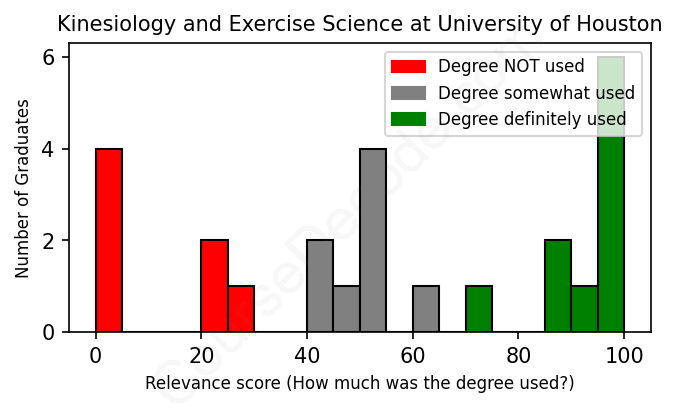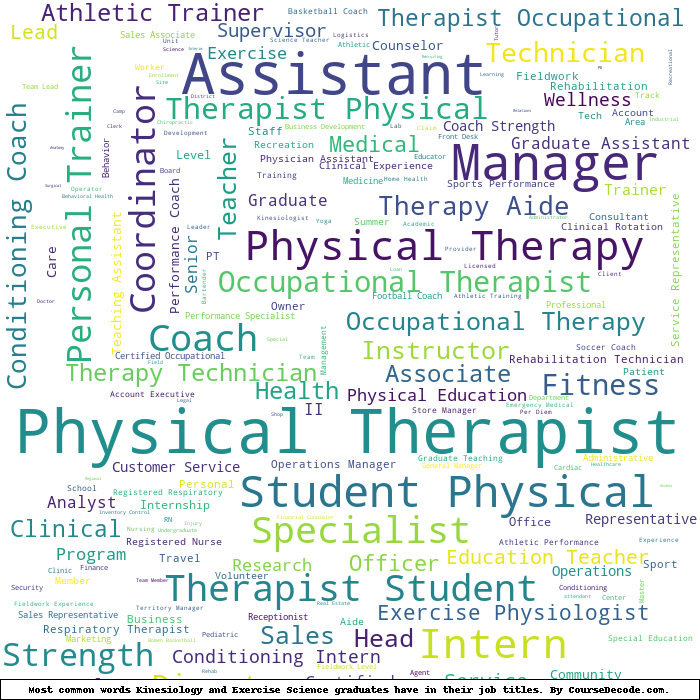
First, some facts. Of the Kinesiology and Exercise Science graduates from University of Houston we've analyzed , here's how many have used (or NOT used) their degree in their career:

These are estimates based on AI analysis of 25 LinkedIn profiles (see below).
The verdict? Significantly below average. Overall, with an average relevance score of 55%, Kinesiology and Exercise Science graduates from University of Houston have a much lower likelihood (-12%) of finding work in this field compared to the average graduate across all fields:
And for comparison, here's the chart for all profiles we've looked at across all degrees.
Also, after graduating, 36% of these graduates have pursued further education other than another Bachelor's degree (such as a Masters degree or other), compared to the average across all profiles of 35%. This suggests you may need more than just a Bachelors degree to be competitive as a Kinesiology and Exercise Science graduate.
See the details:
|
Relevance score: 85% We think this person has gone into a career highly relevant to their degree. We think this person has gone into a career highly relevant to their degree.
DEGREE INFOGraduated in 2014 from University of Houston with a Bachelor of Science (B.S.) in Kinesiology and Exercise Science. No other secondary education since. JOB HISTORY SINCE GRADUATIONEmployee Tailgate USA Apr 2014 - Jul 2014 Offensive Line Coach  Broken Arrow Public Schools Mar 2015 - Present Regional Acquisition Director Southwest  Team Attack Academy Feb 2017 - Present Cohost  Run The Power : A Football Coachs Podcast Jan 2018 - Present ABOUTI coach offensive line. I am a science teacher. I am the cohost of Run The Power : A Football Coachs Podcast |
The top 10 most common jobs done by the graduates we've analyzed (ranked most common to least) are:
Looking at the career paths of folks who studied Kinesiology and Exercise Science at the University of Houston, it's clear that a good mix of jobs related to their degree remain common. Many graduates have landed roles such as Physical Therapists, Rehabilitation Technicians, and Personal Trainers. These positions directly apply the knowledge and skills acquired during their studies, focusing on areas like fitness, rehabilitation, and exercise physiology. Coaching roles, like Offensive Line Coach and various positions in sports performance, also reflect a direct connection to the principles of kinesiology, allowing for the practical application of what they’ve learned about human performance and conditioning.
However, there’s a noticeable trend where some graduates have taken jobs that don’t explicitly require their Kinesiology background. Roles in sales, operations management, and some educational positions tend to stray away from the core focus of their degree. In these cases, even though their experiences may benefit from some health or wellness knowledge gained during their studies, the jobs themselves often rely more on general business or administrative skills rather than specialized kinesiology expertise. So, while many Kinesiology graduates certainly find relevant positions, there’s a significant number who end up in fields that don’t fully utilize their degree’s potential.
Here is a visual representation of the most common words in job titles for Kinesiology and Exercise Science graduates (this is across all Kinesiology and Exercise Science graduates we've analyzed, not just those who went to University of Houston):

When looking at the career trajectories of graduates with a degree in Kinesiology and Exercise Science from the University of Houston, it's clear that many start off their careers in roles that are closely related to their field right after graduation. A common first job seems to be in positions like personal training, rehabilitation assistance, or even teaching roles, as seen with early career choices like personal trainer or biology teacher. Many graduates zero in on the healthcare industry, particularly in physical therapy, which offers a strong alignment with their academic background. This makes sense given the focus of their studies and the skills they've developed throughout their degree.
Fast forward five to ten years, and the landscape is a bit mixed. While some individuals have transitioned successfully into specialized roles such as physical therapists or health consultants, others have diverged from the typical career paths more entrenched in kinesiology. For instance, some have taken on managerial or operations roles in completely different sectors, like sales or administration. This suggests that while the degree provides a solid foundation for many health-related careers, graduates are also branching out into various fields, possibly influenced by evolving personal interests or job market opportunities. Overall, there's a blend of success stories within related fields and some other graduates exploring paths that may not directly connect to their Kinesiology and Exercise Science education.
Honestly, a Bachelor’s degree in Kinesiology and Exercise Science can be a pretty manageable ride, especially if you have a genuine interest in fitness, health, or sports. At University of Houston, you’ll find that the course load includes a mix of both theoretical classes and hands-on labs, which is great if you learn better by doing. Some people say it’s easier than a lot of other STEM majors, but it still takes dedication and some late-night study sessions, especially for the tougher subjects like anatomy and physiology. If you're passionate about the topics and up for staying on top of your assignments, you should find it challenging yet enjoyable without being overwhelmingly tough.
Most commonly, in the LinkedIn profiles we've looked at, it takes people 4 years to finish a Bachelor degree in Kinesiology and Exercise Science.
Alright, so looking at these Kinesiology and Exercise Science grads from the University of Houston, it seems like they’ve landed a mix of decent jobs, but earnings likely vary quite a bit. Some early-career positions, like personal trainers and various coordinator roles, probably don’t pay top dollar, especially right out of college. However, folks moving into physical therapy and management positions at places like Baylor College of Medicine and CVS Health may be making more substantial incomes. The later graduates seem to be on a brighter path, with internships and entries into more specialized roles, which could lead to better pay in the future. Overall, while some are doing alright, especially as they gain experience, others might still be figuring out their financial footing in a field that's definitely competitive.
Here is a visual representation of the most common words seen in the "about" section of LinkedIn profiles who have a Bachelor degree in Kinesiology and Exercise Science (this is across all Kinesiology and Exercise Science graduates we've analyzed, not just those who went to University of Houston). This may or may not be useful:

Here are all colleges offering a Bachelor degree in Kinesiology and Exercise Science (ordered by the average relevance score of their Kinesiology and Exercise Science graduates, best to worst) where we have analyzed at least 10 of their graduates: